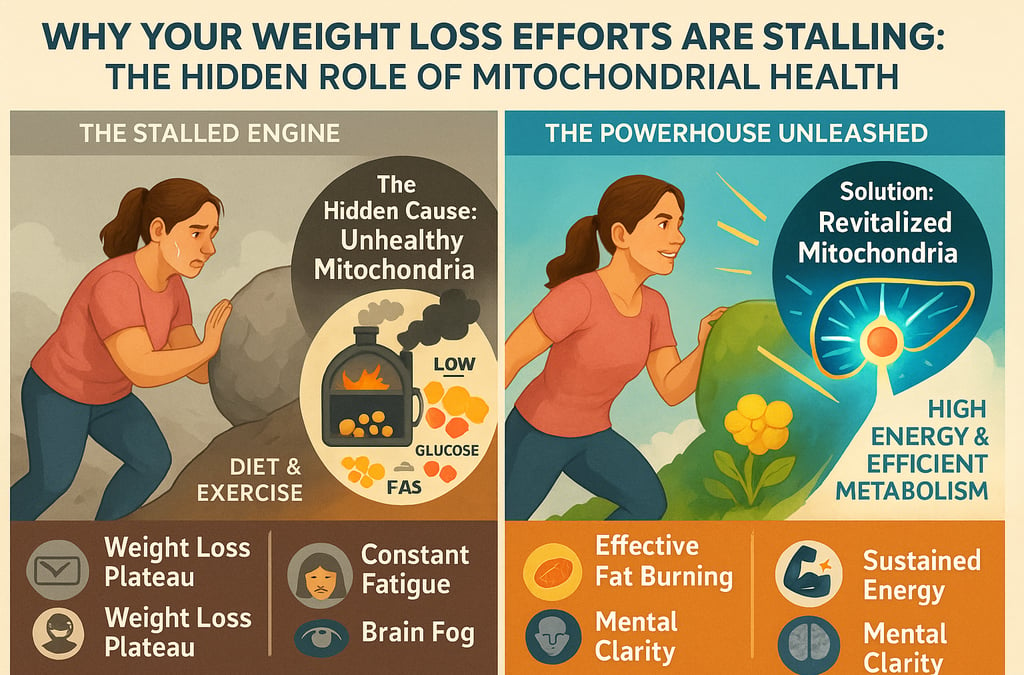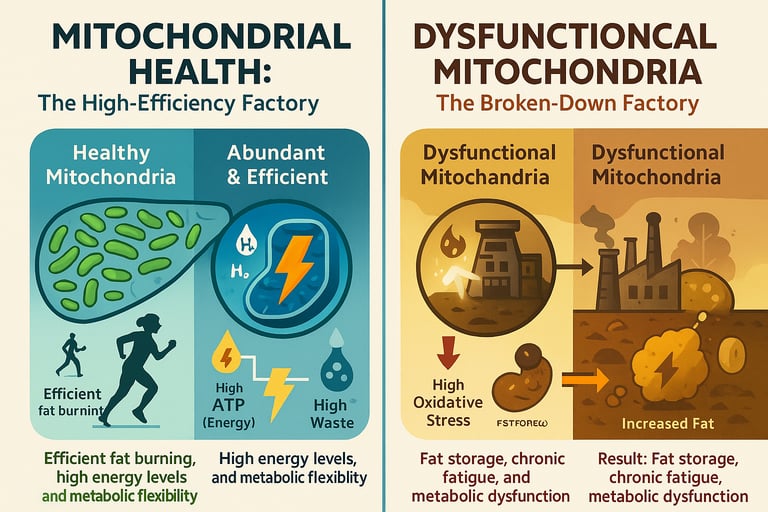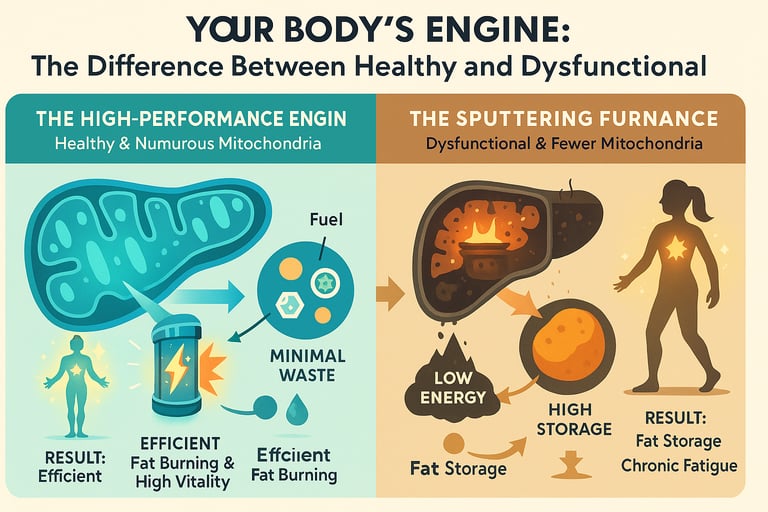Why Am I Not Losing Weight On A Diet: The Hidden Role of Mitochondrial Health
Struggling with stalled weight loss? Discover why your efforts aren't working and the hidden role of mitochondrial health. Learn how to reignite your metabolism and overcome stubborn fat. Find out why am I not losing weight on a diet.
8/14/20255 min read


Why Your Weight Loss Efforts Are Stalling: The Hidden Role of Mitochondrial Health
The Frustrating Truth: Why the Scale Won't Budge
Imagine diligently tracking every calorie, pushing through grueling workouts, and yet, the numbers on the scale refuse to budge. Or worse, they creep back up. If this scenario sounds painfully familiar, you're far from alone. For millions, the weight loss journey isn't a linear path; it's a frustrating maze of plateaus and setbacks, leaving us wondering, "why am I not losing weight on a diet?" We're often told it's a simple equation of 'calories in, calories out,' but what if the true answer lies deeper, within the very powerhouses of your cells?
Blog Talk About
Beyond Calories: Stalled weight loss often goes beyond simple caloric deficits, pointing to deeper metabolic inefficiencies.
Mitochondria are Key: These cellular powerhouses are vital for efficient fat burning and energy production; their dysfunction can hinder weight loss.
Metabolic Slowdown: Impaired mitochondrial function can lead to a sluggish metabolism, making it harder to shed stubborn fat.
Holistic Approach: Reigniting your metabolism requires nourishing your mitochondria through specific nutrients, targeted exercise, adequate sleep, and stress management.
The Cellular Engine: Understanding Your Mitochondria
For decades, the prevailing wisdom around weight loss centered almost exclusively on diet and exercise. Eat less, move more. While fundamental, this advice often overlooks a critical player in your body's energy equation: your mitochondria. Think of mitochondria as the microscopic power plants within nearly every cell of your body. Their primary job? To convert the food you eat into adenosine triphosphate (ATP), the energy currency your cells use to perform every function, from thinking to, yes, burning fat.
When Energy Production Fails
When your mitochondria are healthy and abundant, they efficiently churn out ATP, supporting a vibrant metabolism. They are particularly adept at oxidizing fats for fuel. However, modern lifestyles, chronic stress, poor diet choices, and even aging can lead to mitochondrial dysfunction. This isn't just a minor hiccup; it means your cells become less efficient at producing energy and, crucially, less efficient at burning fat. Instead of robust power plants, they become sputtering engines, making it incredibly difficult to understand why your weight loss efforts are stalling.
Research increasingly points to mitochondrial dysfunction as a central feature in the development and progression of obesity and related metabolic disorders. When these tiny furnaces aren't firing on all cylinders, your body struggles to generate the energy it needs, impacting everything from physical stamina to cognitive clarity.
The Link to Stubborn Fat and Metabolic Slowdown
So, how does sluggish mitochondrial function explain why your weight loss efforts are stalling? When your cells aren't efficiently converting fat into energy, your body becomes reluctant to release its fat stores. It's like having a full gas tank but a clogged fuel line the energy is there, but it can't be accessed and utilized properly. This inefficiency contributes to a slower metabolic rate, making it incredibly challenging to create the caloric deficit needed for sustained weight loss, even when you're doing 'everything right.' Your body essentially becomes a reluctant fat burner, prioritizing storage over expenditure.
Rekindling Your Inner Furnace: Strategies for Mitochondrial Health
Optimizing mitochondrial health isn't about a quick fix; it's about providing your body with the fundamental tools it needs to operate at its peak. It's about shifting your body from a fat-storing machine to an efficient fat-burning engine.
Nutrient Powerhouses for Mitochondria
Your mitochondria thrive on specific micronutrients and antioxidants. Consider incorporating foods rich in:
B Vitamins: Essential cofactors in energy production (found in whole grains, leafy greens, lean meats).
Magnesium: Crucial for ATP synthesis (dark leafy greens, nuts, seeds, legumes).
Coenzyme Q10 (CoQ10): A vital antioxidant in the electron transport chain (fatty fish, organ meats, spinach).
Alpha-Lipoic Acid (ALA): Supports mitochondrial enzymes and acts as an antioxidant (red meat, broccoli, spinach).
Omega-3 Fatty Acids: Help maintain mitochondrial membrane integrity (fatty fish, flaxseeds, walnuts.
Polyphenols: Found in colorful fruits and vegetables, green tea, and dark chocolate, these compounds can stimulate mitochondrial biogenesis (the creation of new mitochondria).
Movement as a Mitochondrial Boost
Exercise, particularly high intensity interval training (HIIT) and resistance training, is a powerful stimulus for mitochondrial biogenesis and function. HIIT challenges your cells to produce energy rapidly, signaling your body to create more efficient mitochondria. Resistance training builds muscle, which is metabolically active tissue packed with mitochondria. Regular physical activity has been shown to improve mitochondrial health and efficiency, directly impacting your body's ability to burn fat.
Beyond Diet and Exercise: Sleep, Stress, and Environment
It's not just what you eat and how you move. Chronic stress, poor sleep, and exposure to environmental toxins can all impair mitochondrial function. Prioritizing 7-9 hours of quality sleep, practicing stress-reduction techniques like meditation or deep breathing, and minimizing exposure to pollutants are crucial, often overlooked components of a holistic weight loss strategy. For instance, inadequate sleep can disrupt metabolic hormones, further hindering your body's fat-burning potential.
Your Action Plan: Reigniting Your Weight Loss Journey
Ready to move beyond the frustration of stalled weight loss? Here's an actionable plan focused on boosting your mitochondrial health:
Prioritize Nutrient Density: Shift your diet towards whole, unprocessed foods rich in the mitochondrial supportive nutrients mentioned above. Focus on colorful vegetables, healthy fats, and lean proteins.
Embrace Varied Exercise: Integrate a mix of strength training (2-3 times per week) and high intensity interval training (1-2 times per week) into your routine, alongside regular moderate intensity activity.
Optimize Sleep: Aim for 7-9 hours of quality sleep per night. Establish a consistent sleep schedule and create a relaxing bedtime routine.
Manage Stress: Incorporate daily stress reduction practices. Whether it's mindfulness, yoga, spending time in nature, or simply deep breathing, find what works for you to lower cortisol levels.
Consider Targeted Support: While a healthy diet is paramount, certain supplements can offer additional support for mitochondrial function, especially if dietary intake is insufficient.
A Product We Trust
When your body's internal engines are struggling, sometimes they need a little extra support to get back on track. For those looking to directly enhance their mitochondrial efficiency and cellular energy production, we highly recommend you check out MITOLYN. This product is formulated to nourish your mitochondria, helping your body reignite its natural fat-burning capabilities and overcome stubborn weight loss plateaus.
Final Thoughts: A New Perspective on Weight Loss
Understanding the hidden role of mitochondrial health can be a profound shift in your approach to weight loss. It moves the conversation beyond mere willpower and calorie counting to a deeper understanding of your body's intricate cellular machinery. By nurturing your mitochondria, you're not just aiming to lose weight; you're building a more efficient, energetic, and resilient body from the inside out. This holistic perspective offers not only a path to breaking through plateaus but also a blueprint for lasting health and vitality.




Health and Wellness
Your trusted source for health and fitness.
Connect
contact: beahealth.it@gmail.com
© 2025. All rights reserved.
